如何翻译英文句子课件(49张PPT)
文档属性
| 名称 | 如何翻译英文句子课件(49张PPT) |

|
|
| 格式 | zip | ||
| 文件大小 | 251.7KB | ||
| 资源类型 | 教案 | ||
| 版本资源 | 牛津译林版 | ||
| 科目 | 英语 | ||
| 更新时间 | 2020-05-09 00:00:00 | ||
图片预览



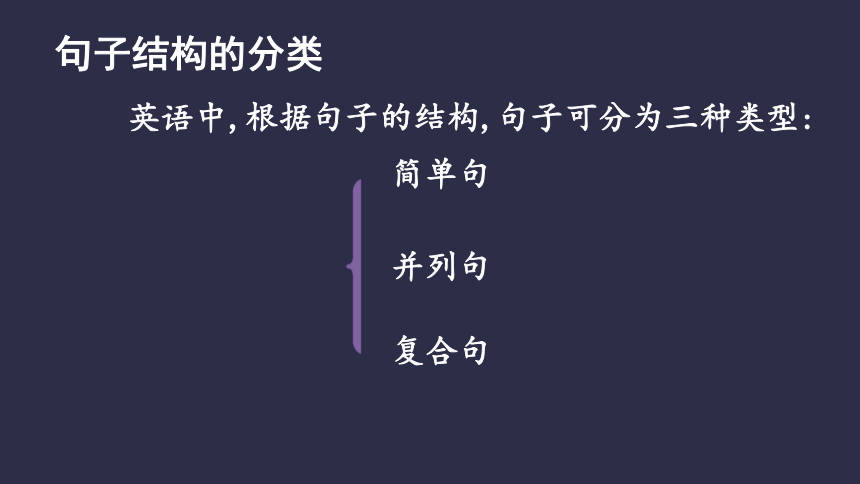
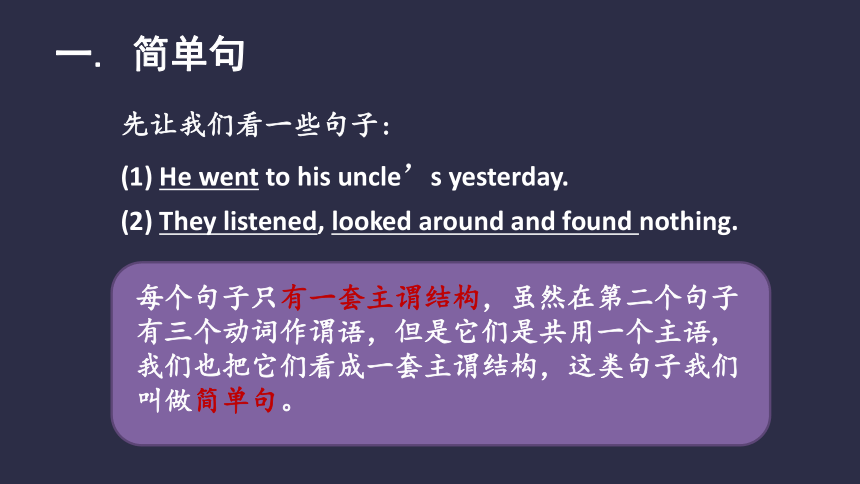
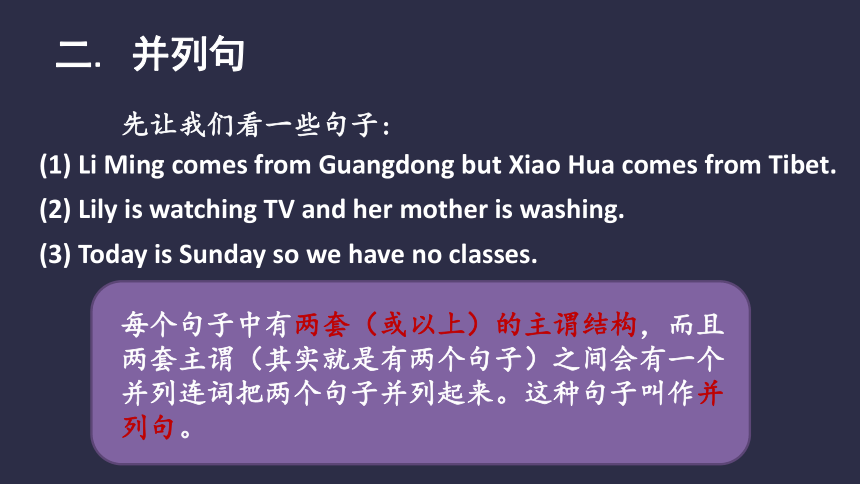
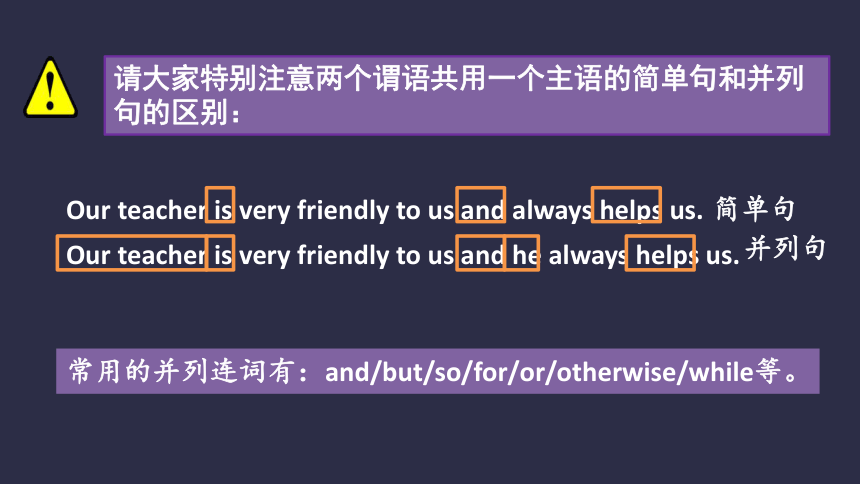
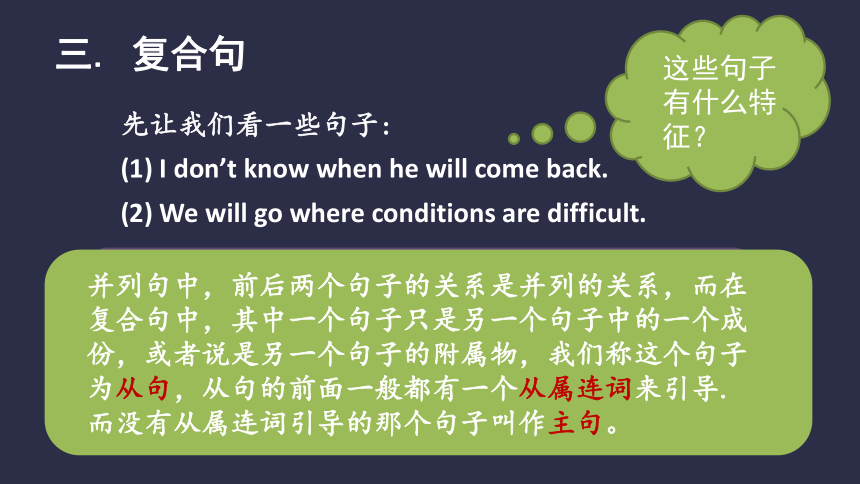
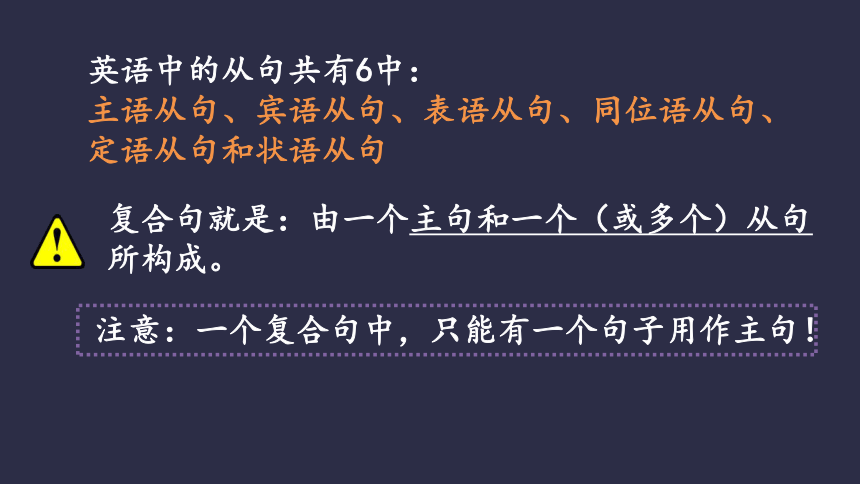
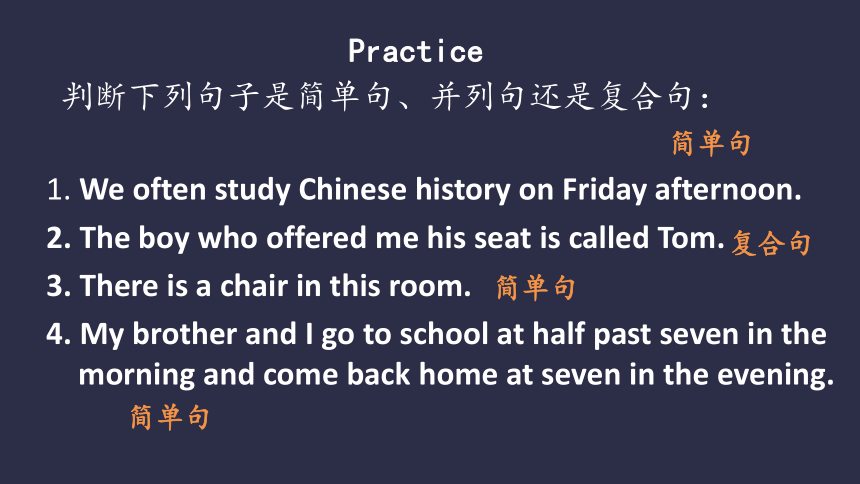
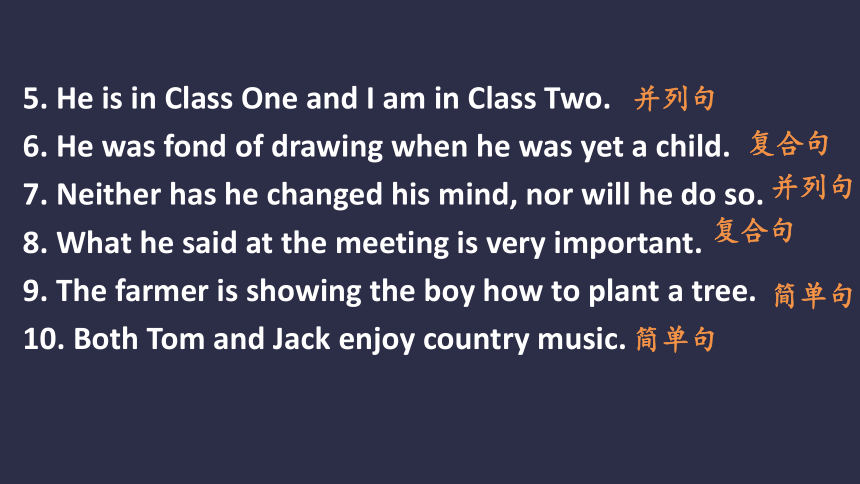
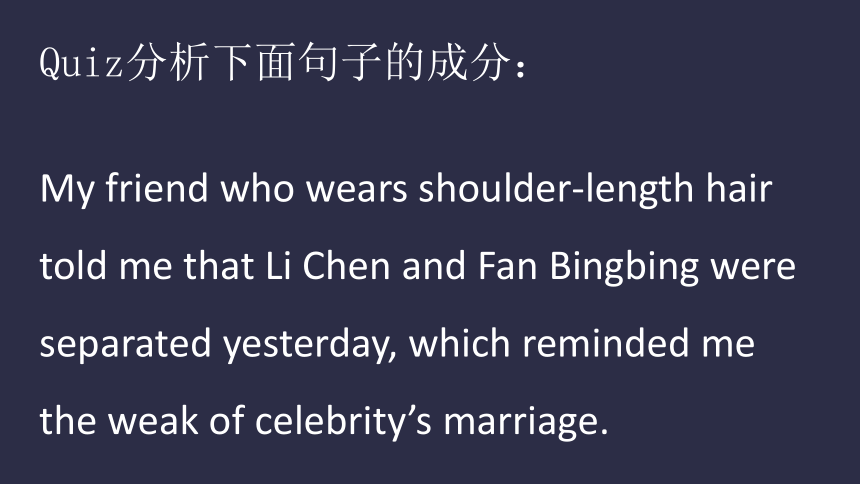
文档简介
(共50张PPT)
如何翻译英语句子?
HOW TO TRANSLATE SENTENCES
01
句子结构
02
句子成份的顺序
03
翻译的要点
04
练习
目录
01
句子结构
句子结构的分类
英语中,根据句子的结构,句子可分为三种类型:
简单句
并列句
复合句
一. 简单句
先让我们看一些句子:
(1) He went to his uncle’s yesterday.
(2) They listened, looked around and found nothing.
每个句子只有一套主谓结构,虽然在第二个句子有三个动词作谓语,但是它们是共用一个主语,我们也把它们看成一套主谓结构,这类句子我们叫做简单句。
二. 并列句
先让我们看一些句子:
(1) Li Ming comes from Guangdong but Xiao Hua comes from Tibet.
(2) Lily is watching TV and her mother is washing.
(3) Today is Sunday so we have no classes.
每个句子中有两套(或以上)的主谓结构,而且两套主谓(其实就是有两个句子)之间会有一个并列连词把两个句子并列起来。这种句子叫作并列句。
请大家特别注意两个谓语共用一个主语的简单句和并列句的区别:
Our teacher is very friendly to us and always helps us.
Our teacher is very friendly to us and he always helps us.
简单句
并列句
常用的并列连词有:and/but/so/for/or/otherwise/while等。
三. 复合句
先让我们看一些句子:
(1) I don’t know when he will come back.
(2) We will go where conditions are difficult.
这两个句子中,每个句子中也有两套主谓结构,但是它们不是并列句,而是复合句。
这些句子有什么特征?
并列句中,前后两个句子的关系是并列的关系,而在复合句中,其中一个句子只是另一个句子中的一个成份,或者说是另一个句子的附属物,我们称这个句子为从句,从句的前面一般都有一个从属连词来引导. 而没有从属连词引导的那个句子叫作主句。
英语中的从句共有6中:
主语从句、宾语从句、表语从句、同位语从句、定语从句和状语从句
复合句就是:由一个主句和一个(或多个)从句所构成。
注意:一个复合句中,只能有一个句子用作主句!
Practice
判断下列句子是简单句、并列句还是复合句:
1. We often study Chinese history on Friday afternoon.
2. The boy who offered me his seat is called Tom.
3. There is a chair in this room.
4. My brother and I go to school at half past seven in the morning and come back home at seven in the evening.
简单句
复合句
简单句
简单句
5. He is in Class One and I am in Class Two.
6. He was fond of drawing when he was yet a child.
7. Neither has he changed his mind, nor will he do so.
8. What he said at the meeting is very important.
9. The farmer is showing the boy how to plant a tree.
10. Both Tom and Jack enjoy country music.
并列句
复合句
并列句
复合句
简单句
简单句
Quiz分析下面句子的成分:
My friend who wears shoulder-length hair told me that Li Chen and Fan Bingbing were separated yesterday, which reminded me the weak of celebrity’s marriage.
五种简单句的基本句式:
基本句型一: S +V (主+谓)
基本句型二: S +V +P (主+系+表)
基本句型三: S +V +O (主+谓+宾)
基本句型四: S +V +O1 +O2 (主+谓+间宾+直宾)
基本句型五: S +V +O +C (主+谓+宾+宾补)
重点考点:
S +V +O1 +O2 (主+谓+间宾+直宾)
S +V +O +C (主+谓+宾+宾补)
John’s father give him a dog.
John’s father call him a dog.
能区分吗?
S +V+O1 +O2 (主+谓+间宾+直宾)
S V(及物) O1(多指人) O2(多指物)
1. I
2. He showed
bought him
me my pictures.
a beautiful skirt.
此句型中的谓语动词必须有两个宾语才能表达完整的意思。这两个宾语一个是动作的直接承受者(多指物),另一个是动作的间接宾语(多指人)。
若要先说出直接宾语,后说间接宾语,则要借助与介词to 或for。
常见的须带双宾语的动词有give,ask,bring,offer,send,pay,lend,show,tell,buy,get等。
若要先说出直接宾语,后说间接宾语,则要借助与介词to或for。
用to侧重指动作的方向,表示朝着,向着,对着某人。
用for侧重指动作的受益者,表示为了某人,替某人。
常跟双宾语的动词有:
需借助 to的:bring, give, lend, hand, offer, pass, pay, promise, return, send, show, teach, tell, write, ask等
需借助for的:buy, call, cook, choose, draw, find, get, make, order, sing等。
He bought me a beautiful skirt.
He bought a beautiful skirt for me.
S +V+O +C(主+谓+宾+宾补)
S V(及物) O(宾语) C(宾补)
1. We
2. They
3. We
4. I keep
call
asked
saw the table
supper
him
them clean.
dinner.
to come back soon.
getting on the bus.
此句型中谓语动词除了跟一个宾语外,还需跟一个补充成分来不足宾语,才能使意思完整。
宾语与宾语补足语有逻辑的主谓关系,若无宾语补足语,则句意不完整。可以用做宾补的有,名词,形容词,副词,介词短语,动词不定式,分词。如, ???
The sun keeps us warm.
I heard him singing
You must get your hair cut.
We made him our team leader.
He often asks his son to do some housework.
现在分词为宾语补足语时,宾语与现在分词之间是主动关系;过去分词为宾语补足语时,宾语与过去分词之间是被动关系。
I heard the girl singing in the classroom.
People found the water polluted.
The next morning she found the man lying in bed, dead.
I often hear this song sung in the street.
一些表示“使,让,令”一类的动词:
let(让),make(使得),have(请,让,使得),keep(使得,让), 以及一些跟感官有关的动词如see(看),hear(听到), watch(观看),feel(感觉到),listen?to?(倾听),observe(观察,看到),look?at?(看到),notice(注意到)等常接复合宾语结构。
若动词后的宾语补足语为不定式时,?常常省掉”to”,但变为被动语态时,?则要带”to”.
Mr Li made us clean the blackboard yesterday.
→ (被动) We were made to clean the blackboard yesterday.
We?often hear?her?sing?next?door.
→(被动)She?is?often heard?to?sing?next?door.
英语中常用 it 做形式宾语,而将真正的宾语放到宾语补足语的后面,是英语常用句型。
即 主语 + 谓语 + it + 宾补 + 真正宾语
常用于此句型的动词有:
think, believe, consider, suppose, find, feel, make
例句:Bad weather made it difficult for us to climb to the top of the mountain.
Practice
判断下列句子属于何种句式.
You are sitting beside a dog.
There comes the bus !
The ego’s potential for expansion is limitless.
Breckenridge hosts the international Snow Sculpture Championships.
Our neighbors gave us a baby bird yesterday.
We think it our duty to study well.
主+谓(S+V)
主+谓(S+V)
主+系+表(S+V+P)
主+动+宾(SVO)
主+动+间宾+直宾(S+V+O1+O2)
主+动+宾+补(SVOC)
Practice
1.我经常在早晨读英语。
2.玛丽是个聪明的学生。
3.我的老师交给我一封信。
4.我母亲经常叫我努力学习。
5.我们叫我们的老师王先生。
6.他正在房里做家庭作业。
翻译下列句子并分析句子结构:
主+谓+宾
主+系+表
主+谓+双宾
主+谓+宾+宾补
主+谓+宾+宾补
主+谓+宾
I often read English in the morning.
Mary is a clever student.
My teacher gave me a letter.
My mother often asks me to study hard.
We call our teacher Mr. Wang.
He is doing his homework in the room.
02
句子成分的顺序
在英语中,一个句子的主语、谓语、宾语和补语与汉语的顺序基本相同,但是定语和状语的顺序与汉语有比较大的区别。
前置定语:单个的形容词、名词或分词等作定语放
在被修饰词的前面
定 语
后置定语:两个或两以上的词构成的形容词短语、介词短
语、不定式短语、分词短语或者定语从句等放
在被修饰词的后面
状 语:在英语中,状语的位置比较灵活,一般放在句末,单个的副词如程度副词或频率副词等也可以放在句中,说话人为了强调时,可以把状语放在句首。
一般简单句翻译的顺序:主+谓+宾+宾补+状。
较复杂简单句的翻译:在上述一般简单句的基础上附加上定语之后显得较长或复杂的句子。
实质上就是在一般简单句的被修饰的名词的前后将其定语附加上去就行了。
一般简单句
那个男孩静静地吃了一个苹果。
That boy ate an apple quietly.
较复杂的简单句
站在树底下的那个小男孩静静地吃了一个很大的从美国进口的苹果。
That little boy standing under the tree ate a very
big apple imported from the USA quietly.
03
翻译要点
关于写作能力
1. 按该语言思维组织语言,符合其文化习惯,语言风格。
2. 把脑海里的中文翻译成英文。
翻译的要点
一、找出基本句型(主干)
二、判断时态
三、把握语态
四、两种语言间的差异与联系
星期三的下午两点半钟我和我来自美国的新朋友汤姆一起在教室学习。
句型?
时态?
语态?
句型 + 时态 + 语态
1. 词汇:英文简而少,中文多而杂
英译汉:happy—愉快,开心,兴高采烈,幸福
汉译英:做、使、把、铺床、煮饭… —make
英译汉时:不要受词汇表里的释义限制
* 学习生词时理解其本质含义,多义间的本质联系
absorb:
吸收, 理解, 沉溺, 专心
吸(水),吸(知识),吸(爱好),吸(做事)
建议:* 学习生词时理解其本质含义,理解多义间的本质联系,才能真正
掌握
* 扩大输入量(听、看、阅读),在不同的语境中体会了解。
两种语言间的差异与联系?
2. 结构:中文随意零散,英文固定句式
(1) 句号的位置
中文按意群,一个意群结束时用句号。
英语按句型,一套完整成分时用句号。
She always talks in class and it makes her teacher angry.
She always talks in class. It makes her teacher angry.
She always talks in class, which makes her teacher …
(2) 零散句型的本质关联
被几家公司拒绝后,他改变主意说服自己从底层做起。
想要学好语言,就要不断努力,充分利用时间练习。
成功路上即使困难重重,都要勇敢地面对困难,永不放弃。
after/when
and
and
Even though
and
because/ as
(3) 省略成分要还原
喜欢英语的话,就听这首歌。
if you like…, you should…
想要学好语言,就要不断努力,充分利 用时间练习。
If you want to … you should
成功路上即使困难重重,都要勇敢地面对困难,永不放弃。
even though there are… you ought to
(4) 发现隐藏的时态
电脑在我们的日常生活中扮演着越来越重要的作用。
你在干嘛?
哎,不好意思我没认出你来。
看见了我就告诉你。
我不是跟你说了吗?
我不是故意的。
怎么没交作业?我不知道要做作业啊。
谢谢,不用了,我吃了。
(5) 发现隐藏的被动语态
衣服洗了没?
作业做好了吗?
这罐子破了。
(6) 思维差异下的不必要
同时他不忘锻炼身体,使自己更加强壮。
(7) 顺序问题
我和Lucy在逛街。
基本句型汉译英练习????
1.她喜欢集邮.
2. 你应当努力学习。
3. 她昨天回家很晚。
4. 那天早上我们谈了很多。
5. 会议将持续两个小时。
6. 在过去的十年里,我的家乡已经发生了巨大的变化。
7. 这种事情全世界各地每天都在发生。
8. 1919年,在北京爆发了“五.四”运动。
8.每天八时开始上课。
9.这个盒子重五公斤。
10.五年前我住在北京。
11.爱丽丝很会游泳。
12.约翰的父亲昨晚去世了。
13.秋天有些鸟飞到南方去。
14.我的爷爷早晨起得很早。
15.每天下午有许多学生到图书馆来借书。
Check the answers:
1. You should study hard.
2. She went home very late yesterday evening.
3. That morning we talked a great deal.
4. The meeting will last (for) two hours.
5. Great changes have taken place in my home town in the past ten years.
6. Things of that sort\kind are happening all over the world every day.
That sort\kind of things is happening all over the world every day.
7. The May Fourth Movement broke out in Beijing in 1919.
8. Classes begin at eight every day.
9. This box weighs five kilos.
10. I lived in Beijing five years ago.
11. Alice swims very well.
12. John’s father died last night.
13. In autumn, some birds fly to the south.
14. My grandfather gets up early in the
morning.
15. Every afternoon a lot of students come to the
library to borrow books.
Exercise practice
1.昨晚我写了一封信。
I wrote a letter last night.
2.这本书他读过多次了。
He has read this book many times.
3.他们成功地完成了计划。(carry out)
They have carried out the plan successfully.
4.你们必须在两周内看完这些书。(finish doing)
You must finish reading these books in two weeks.
5.那位先生能流利地说三种语言。
That gentlemen can speak three languages fluently.
6.我开窗户你在意吗?
Do you mind my opening the window?
7.Jim 还不会自己穿衣服。(dress oneself)
Jim cannot dress himself.
8.我不信任那个人。 (believe in)
I don’t believe in that man.
9.他指出了我作文中的错误。 (point out)
He pointed out the mistakes in my composition.
10.圣诞节我们将去看望外籍老师。 (call on\ pay a visit to)
On Christmas Day, we will call on our foreign teachers.
11.你们必须在课后把练习本交上来。(hand in)
You must hand in your exercise-books after class.
12.五分钟内我们是不可能解决出这道题的。 (work out)
We cannot work out the problem in five minutes.
13.这位护士会好好照顾你父亲的。 (take good care of)
The nurse will take good care of your father.
14.你在工作中可依靠他。(depend on)
You can depend on him in your work.
15.写完作文后,我们必须把它从头到尾看一遍。(go over)
After writing a composition, we must go over(介)it.
翻译练习:
我的兄弟都是大学生。
冬季白天短,夜晚长。
布朗夫人看起来很健康。
十五岁他就成为有名的钢琴家了。
孩子们,请保持安静。
My brothers are all college\university students.
In winter, the days are short and the nights are long.
Mrs Brown looks very healthy.
At the age of fifteen he became a famous pianist.
Children, keep quiet please.
这本书是有关美国历史的书。
她的工作是在幼儿园里照看儿童。
他失业了。
树叶已经变黄了。
这个报告听起来很有意思。
This book is about the history of the United States.
Her job is to look after the children in the nursery.
He is out of work. (思考He lost his job.什么句型?)
The leaves have turned yellow.
The report sounds interesting.
1. Johnson先生去年教我们德语。
?2. 奶奶昨晚给我们讲了一个有趣的故事。
?3. Mary把钱包交给校长了。
?4. 请把那本字典递给我好吗?
?5. 他把车票给列车员看。
?6. 这个学期我已经给父母写过三封信了
1. Mr Johnson taught us German last year.
2. Grandma told me an interesting story last night.
3. Mary handed the wallet to the schoolmaster.
4. Would you please pass me the dictionary?
5. He showed the ticket to the conductor.
6. This term I have written three letters to my parents.
7. 我父亲已经给我买了一辆新自行车。
?8. Robinson Crusoe 给自己做了一只小船。
?9. 请你给我弄一本新的,好吗?
10. 我替你叫辆出租汽车好吗?
11. 新式机器将会为你节省许多劳动。
7. My father has bought me a new bike.
8. Robinson Crusoe made himself a boat.
9. Will you please get me a new copy?
10. Shall I call you a taxi?
11. The new machine will save you a lot of labour。
翻译练习:
我们叫她Alice.
他的父母给他取名为John.
痛苦使得他叫喊起来。
我们不会让她在晚上外出的。
他请我们参加游戏。
我要你把真相告诉我。
We call her Alice.
His parents named him John.
The pain made him cry out. .
We won’t let her go out at night..
He asked us to join in the game.
I want you to tell me the truth.
使用it当形式宾语翻译下面的句子
1.他感到很难跟你交谈。
2.我认为有可能用另一种方法解题。
3.学校定了一条规则,开始上课时学生要起立。
4. 我认为与那个人谈话是无益的。
1.He felt it very difficult to talk with you.
2.I consider it possible to work out the problem in
another way.
3.The school made it a rule that the students should
stand up when class begins.
4.I thought it no use talking with that man
如何翻译英语句子?
HOW TO TRANSLATE SENTENCES
01
句子结构
02
句子成份的顺序
03
翻译的要点
04
练习
目录
01
句子结构
句子结构的分类
英语中,根据句子的结构,句子可分为三种类型:
简单句
并列句
复合句
一. 简单句
先让我们看一些句子:
(1) He went to his uncle’s yesterday.
(2) They listened, looked around and found nothing.
每个句子只有一套主谓结构,虽然在第二个句子有三个动词作谓语,但是它们是共用一个主语,我们也把它们看成一套主谓结构,这类句子我们叫做简单句。
二. 并列句
先让我们看一些句子:
(1) Li Ming comes from Guangdong but Xiao Hua comes from Tibet.
(2) Lily is watching TV and her mother is washing.
(3) Today is Sunday so we have no classes.
每个句子中有两套(或以上)的主谓结构,而且两套主谓(其实就是有两个句子)之间会有一个并列连词把两个句子并列起来。这种句子叫作并列句。
请大家特别注意两个谓语共用一个主语的简单句和并列句的区别:
Our teacher is very friendly to us and always helps us.
Our teacher is very friendly to us and he always helps us.
简单句
并列句
常用的并列连词有:and/but/so/for/or/otherwise/while等。
三. 复合句
先让我们看一些句子:
(1) I don’t know when he will come back.
(2) We will go where conditions are difficult.
这两个句子中,每个句子中也有两套主谓结构,但是它们不是并列句,而是复合句。
这些句子有什么特征?
并列句中,前后两个句子的关系是并列的关系,而在复合句中,其中一个句子只是另一个句子中的一个成份,或者说是另一个句子的附属物,我们称这个句子为从句,从句的前面一般都有一个从属连词来引导. 而没有从属连词引导的那个句子叫作主句。
英语中的从句共有6中:
主语从句、宾语从句、表语从句、同位语从句、定语从句和状语从句
复合句就是:由一个主句和一个(或多个)从句所构成。
注意:一个复合句中,只能有一个句子用作主句!
Practice
判断下列句子是简单句、并列句还是复合句:
1. We often study Chinese history on Friday afternoon.
2. The boy who offered me his seat is called Tom.
3. There is a chair in this room.
4. My brother and I go to school at half past seven in the morning and come back home at seven in the evening.
简单句
复合句
简单句
简单句
5. He is in Class One and I am in Class Two.
6. He was fond of drawing when he was yet a child.
7. Neither has he changed his mind, nor will he do so.
8. What he said at the meeting is very important.
9. The farmer is showing the boy how to plant a tree.
10. Both Tom and Jack enjoy country music.
并列句
复合句
并列句
复合句
简单句
简单句
Quiz分析下面句子的成分:
My friend who wears shoulder-length hair told me that Li Chen and Fan Bingbing were separated yesterday, which reminded me the weak of celebrity’s marriage.
五种简单句的基本句式:
基本句型一: S +V (主+谓)
基本句型二: S +V +P (主+系+表)
基本句型三: S +V +O (主+谓+宾)
基本句型四: S +V +O1 +O2 (主+谓+间宾+直宾)
基本句型五: S +V +O +C (主+谓+宾+宾补)
重点考点:
S +V +O1 +O2 (主+谓+间宾+直宾)
S +V +O +C (主+谓+宾+宾补)
John’s father give him a dog.
John’s father call him a dog.
能区分吗?
S +V+O1 +O2 (主+谓+间宾+直宾)
S V(及物) O1(多指人) O2(多指物)
1. I
2. He showed
bought him
me my pictures.
a beautiful skirt.
此句型中的谓语动词必须有两个宾语才能表达完整的意思。这两个宾语一个是动作的直接承受者(多指物),另一个是动作的间接宾语(多指人)。
若要先说出直接宾语,后说间接宾语,则要借助与介词to 或for。
常见的须带双宾语的动词有give,ask,bring,offer,send,pay,lend,show,tell,buy,get等。
若要先说出直接宾语,后说间接宾语,则要借助与介词to或for。
用to侧重指动作的方向,表示朝着,向着,对着某人。
用for侧重指动作的受益者,表示为了某人,替某人。
常跟双宾语的动词有:
需借助 to的:bring, give, lend, hand, offer, pass, pay, promise, return, send, show, teach, tell, write, ask等
需借助for的:buy, call, cook, choose, draw, find, get, make, order, sing等。
He bought me a beautiful skirt.
He bought a beautiful skirt for me.
S +V+O +C(主+谓+宾+宾补)
S V(及物) O(宾语) C(宾补)
1. We
2. They
3. We
4. I keep
call
asked
saw the table
supper
him
them clean.
dinner.
to come back soon.
getting on the bus.
此句型中谓语动词除了跟一个宾语外,还需跟一个补充成分来不足宾语,才能使意思完整。
宾语与宾语补足语有逻辑的主谓关系,若无宾语补足语,则句意不完整。可以用做宾补的有,名词,形容词,副词,介词短语,动词不定式,分词。如, ???
The sun keeps us warm.
I heard him singing
You must get your hair cut.
We made him our team leader.
He often asks his son to do some housework.
现在分词为宾语补足语时,宾语与现在分词之间是主动关系;过去分词为宾语补足语时,宾语与过去分词之间是被动关系。
I heard the girl singing in the classroom.
People found the water polluted.
The next morning she found the man lying in bed, dead.
I often hear this song sung in the street.
一些表示“使,让,令”一类的动词:
let(让),make(使得),have(请,让,使得),keep(使得,让), 以及一些跟感官有关的动词如see(看),hear(听到), watch(观看),feel(感觉到),listen?to?(倾听),observe(观察,看到),look?at?(看到),notice(注意到)等常接复合宾语结构。
若动词后的宾语补足语为不定式时,?常常省掉”to”,但变为被动语态时,?则要带”to”.
Mr Li made us clean the blackboard yesterday.
→ (被动) We were made to clean the blackboard yesterday.
We?often hear?her?sing?next?door.
→(被动)She?is?often heard?to?sing?next?door.
英语中常用 it 做形式宾语,而将真正的宾语放到宾语补足语的后面,是英语常用句型。
即 主语 + 谓语 + it + 宾补 + 真正宾语
常用于此句型的动词有:
think, believe, consider, suppose, find, feel, make
例句:Bad weather made it difficult for us to climb to the top of the mountain.
Practice
判断下列句子属于何种句式.
You are sitting beside a dog.
There comes the bus !
The ego’s potential for expansion is limitless.
Breckenridge hosts the international Snow Sculpture Championships.
Our neighbors gave us a baby bird yesterday.
We think it our duty to study well.
主+谓(S+V)
主+谓(S+V)
主+系+表(S+V+P)
主+动+宾(SVO)
主+动+间宾+直宾(S+V+O1+O2)
主+动+宾+补(SVOC)
Practice
1.我经常在早晨读英语。
2.玛丽是个聪明的学生。
3.我的老师交给我一封信。
4.我母亲经常叫我努力学习。
5.我们叫我们的老师王先生。
6.他正在房里做家庭作业。
翻译下列句子并分析句子结构:
主+谓+宾
主+系+表
主+谓+双宾
主+谓+宾+宾补
主+谓+宾+宾补
主+谓+宾
I often read English in the morning.
Mary is a clever student.
My teacher gave me a letter.
My mother often asks me to study hard.
We call our teacher Mr. Wang.
He is doing his homework in the room.
02
句子成分的顺序
在英语中,一个句子的主语、谓语、宾语和补语与汉语的顺序基本相同,但是定语和状语的顺序与汉语有比较大的区别。
前置定语:单个的形容词、名词或分词等作定语放
在被修饰词的前面
定 语
后置定语:两个或两以上的词构成的形容词短语、介词短
语、不定式短语、分词短语或者定语从句等放
在被修饰词的后面
状 语:在英语中,状语的位置比较灵活,一般放在句末,单个的副词如程度副词或频率副词等也可以放在句中,说话人为了强调时,可以把状语放在句首。
一般简单句翻译的顺序:主+谓+宾+宾补+状。
较复杂简单句的翻译:在上述一般简单句的基础上附加上定语之后显得较长或复杂的句子。
实质上就是在一般简单句的被修饰的名词的前后将其定语附加上去就行了。
一般简单句
那个男孩静静地吃了一个苹果。
That boy ate an apple quietly.
较复杂的简单句
站在树底下的那个小男孩静静地吃了一个很大的从美国进口的苹果。
That little boy standing under the tree ate a very
big apple imported from the USA quietly.
03
翻译要点
关于写作能力
1. 按该语言思维组织语言,符合其文化习惯,语言风格。
2. 把脑海里的中文翻译成英文。
翻译的要点
一、找出基本句型(主干)
二、判断时态
三、把握语态
四、两种语言间的差异与联系
星期三的下午两点半钟我和我来自美国的新朋友汤姆一起在教室学习。
句型?
时态?
语态?
句型 + 时态 + 语态
1. 词汇:英文简而少,中文多而杂
英译汉:happy—愉快,开心,兴高采烈,幸福
汉译英:做、使、把、铺床、煮饭… —make
英译汉时:不要受词汇表里的释义限制
* 学习生词时理解其本质含义,多义间的本质联系
absorb:
吸收, 理解, 沉溺, 专心
吸(水),吸(知识),吸(爱好),吸(做事)
建议:* 学习生词时理解其本质含义,理解多义间的本质联系,才能真正
掌握
* 扩大输入量(听、看、阅读),在不同的语境中体会了解。
两种语言间的差异与联系?
2. 结构:中文随意零散,英文固定句式
(1) 句号的位置
中文按意群,一个意群结束时用句号。
英语按句型,一套完整成分时用句号。
She always talks in class and it makes her teacher angry.
She always talks in class. It makes her teacher angry.
She always talks in class, which makes her teacher …
(2) 零散句型的本质关联
被几家公司拒绝后,他改变主意说服自己从底层做起。
想要学好语言,就要不断努力,充分利用时间练习。
成功路上即使困难重重,都要勇敢地面对困难,永不放弃。
after/when
and
and
Even though
and
because/ as
(3) 省略成分要还原
喜欢英语的话,就听这首歌。
if you like…, you should…
想要学好语言,就要不断努力,充分利 用时间练习。
If you want to … you should
成功路上即使困难重重,都要勇敢地面对困难,永不放弃。
even though there are… you ought to
(4) 发现隐藏的时态
电脑在我们的日常生活中扮演着越来越重要的作用。
你在干嘛?
哎,不好意思我没认出你来。
看见了我就告诉你。
我不是跟你说了吗?
我不是故意的。
怎么没交作业?我不知道要做作业啊。
谢谢,不用了,我吃了。
(5) 发现隐藏的被动语态
衣服洗了没?
作业做好了吗?
这罐子破了。
(6) 思维差异下的不必要
同时他不忘锻炼身体,使自己更加强壮。
(7) 顺序问题
我和Lucy在逛街。
基本句型汉译英练习????
1.她喜欢集邮.
2. 你应当努力学习。
3. 她昨天回家很晚。
4. 那天早上我们谈了很多。
5. 会议将持续两个小时。
6. 在过去的十年里,我的家乡已经发生了巨大的变化。
7. 这种事情全世界各地每天都在发生。
8. 1919年,在北京爆发了“五.四”运动。
8.每天八时开始上课。
9.这个盒子重五公斤。
10.五年前我住在北京。
11.爱丽丝很会游泳。
12.约翰的父亲昨晚去世了。
13.秋天有些鸟飞到南方去。
14.我的爷爷早晨起得很早。
15.每天下午有许多学生到图书馆来借书。
Check the answers:
1. You should study hard.
2. She went home very late yesterday evening.
3. That morning we talked a great deal.
4. The meeting will last (for) two hours.
5. Great changes have taken place in my home town in the past ten years.
6. Things of that sort\kind are happening all over the world every day.
That sort\kind of things is happening all over the world every day.
7. The May Fourth Movement broke out in Beijing in 1919.
8. Classes begin at eight every day.
9. This box weighs five kilos.
10. I lived in Beijing five years ago.
11. Alice swims very well.
12. John’s father died last night.
13. In autumn, some birds fly to the south.
14. My grandfather gets up early in the
morning.
15. Every afternoon a lot of students come to the
library to borrow books.
Exercise practice
1.昨晚我写了一封信。
I wrote a letter last night.
2.这本书他读过多次了。
He has read this book many times.
3.他们成功地完成了计划。(carry out)
They have carried out the plan successfully.
4.你们必须在两周内看完这些书。(finish doing)
You must finish reading these books in two weeks.
5.那位先生能流利地说三种语言。
That gentlemen can speak three languages fluently.
6.我开窗户你在意吗?
Do you mind my opening the window?
7.Jim 还不会自己穿衣服。(dress oneself)
Jim cannot dress himself.
8.我不信任那个人。 (believe in)
I don’t believe in that man.
9.他指出了我作文中的错误。 (point out)
He pointed out the mistakes in my composition.
10.圣诞节我们将去看望外籍老师。 (call on\ pay a visit to)
On Christmas Day, we will call on our foreign teachers.
11.你们必须在课后把练习本交上来。(hand in)
You must hand in your exercise-books after class.
12.五分钟内我们是不可能解决出这道题的。 (work out)
We cannot work out the problem in five minutes.
13.这位护士会好好照顾你父亲的。 (take good care of)
The nurse will take good care of your father.
14.你在工作中可依靠他。(depend on)
You can depend on him in your work.
15.写完作文后,我们必须把它从头到尾看一遍。(go over)
After writing a composition, we must go over(介)it.
翻译练习:
我的兄弟都是大学生。
冬季白天短,夜晚长。
布朗夫人看起来很健康。
十五岁他就成为有名的钢琴家了。
孩子们,请保持安静。
My brothers are all college\university students.
In winter, the days are short and the nights are long.
Mrs Brown looks very healthy.
At the age of fifteen he became a famous pianist.
Children, keep quiet please.
这本书是有关美国历史的书。
她的工作是在幼儿园里照看儿童。
他失业了。
树叶已经变黄了。
这个报告听起来很有意思。
This book is about the history of the United States.
Her job is to look after the children in the nursery.
He is out of work. (思考He lost his job.什么句型?)
The leaves have turned yellow.
The report sounds interesting.
1. Johnson先生去年教我们德语。
?2. 奶奶昨晚给我们讲了一个有趣的故事。
?3. Mary把钱包交给校长了。
?4. 请把那本字典递给我好吗?
?5. 他把车票给列车员看。
?6. 这个学期我已经给父母写过三封信了
1. Mr Johnson taught us German last year.
2. Grandma told me an interesting story last night.
3. Mary handed the wallet to the schoolmaster.
4. Would you please pass me the dictionary?
5. He showed the ticket to the conductor.
6. This term I have written three letters to my parents.
7. 我父亲已经给我买了一辆新自行车。
?8. Robinson Crusoe 给自己做了一只小船。
?9. 请你给我弄一本新的,好吗?
10. 我替你叫辆出租汽车好吗?
11. 新式机器将会为你节省许多劳动。
7. My father has bought me a new bike.
8. Robinson Crusoe made himself a boat.
9. Will you please get me a new copy?
10. Shall I call you a taxi?
11. The new machine will save you a lot of labour。
翻译练习:
我们叫她Alice.
他的父母给他取名为John.
痛苦使得他叫喊起来。
我们不会让她在晚上外出的。
他请我们参加游戏。
我要你把真相告诉我。
We call her Alice.
His parents named him John.
The pain made him cry out. .
We won’t let her go out at night..
He asked us to join in the game.
I want you to tell me the truth.
使用it当形式宾语翻译下面的句子
1.他感到很难跟你交谈。
2.我认为有可能用另一种方法解题。
3.学校定了一条规则,开始上课时学生要起立。
4. 我认为与那个人谈话是无益的。
1.He felt it very difficult to talk with you.
2.I consider it possible to work out the problem in
another way.
3.The school made it a rule that the students should
stand up when class begins.
4.I thought it no use talking with that man
同课章节目录
